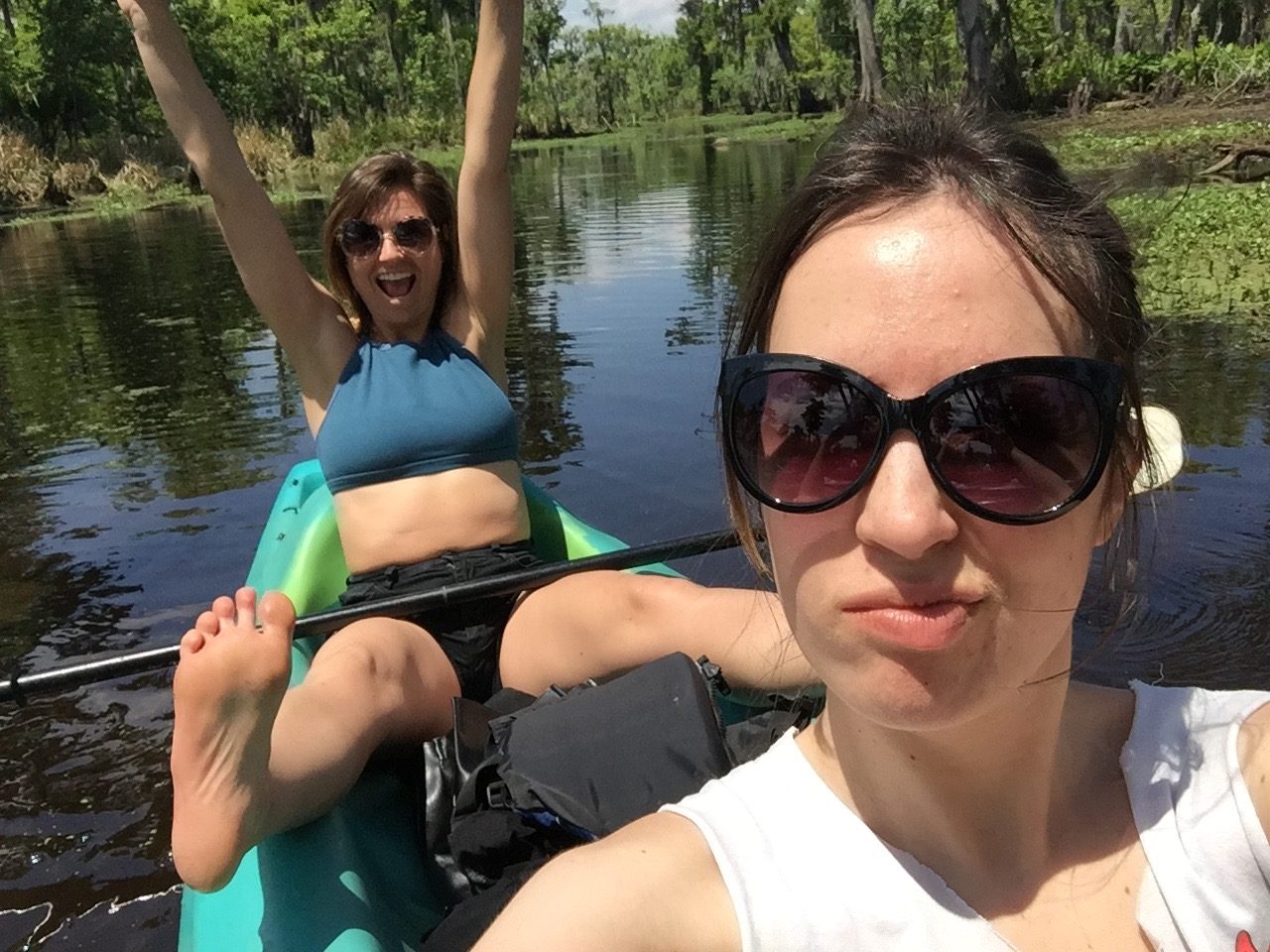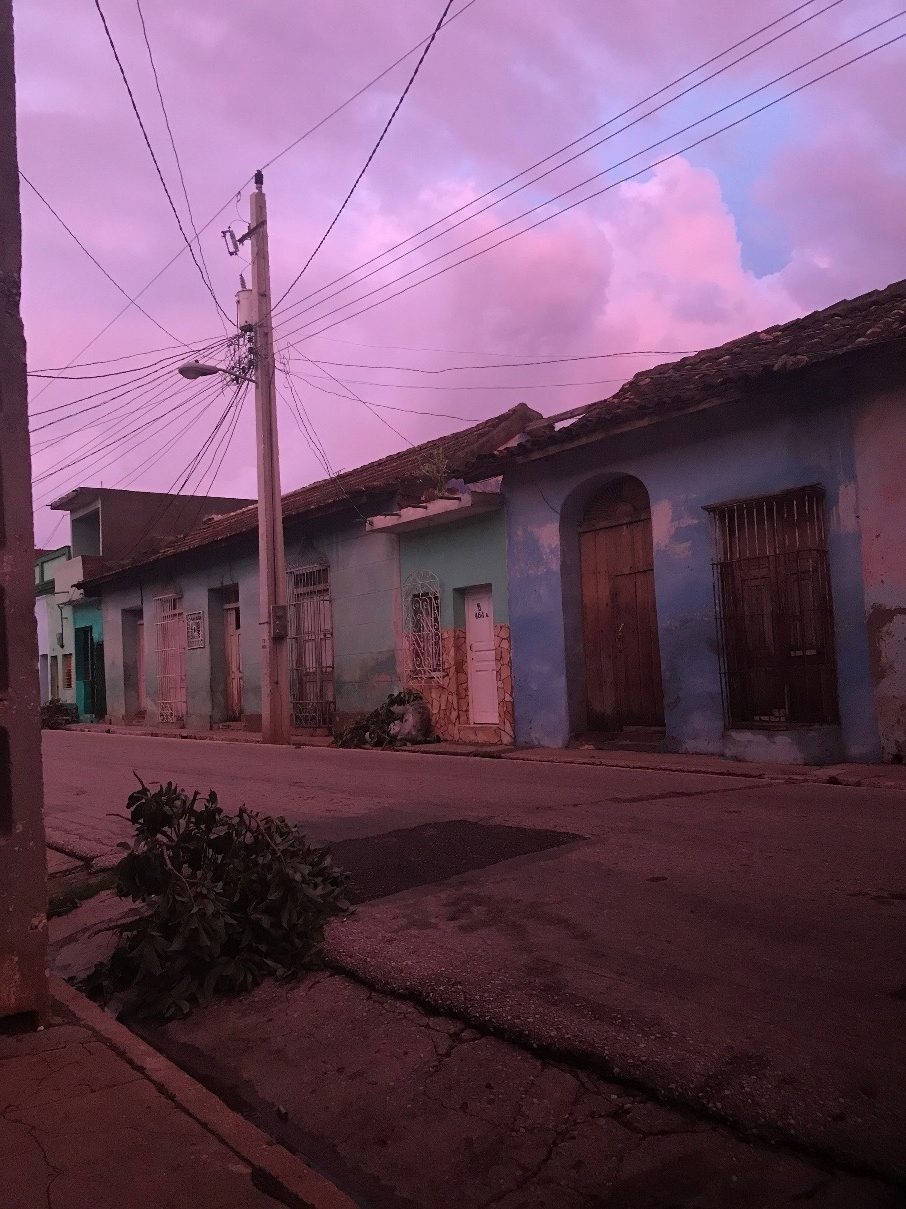Editor’s note: This post was written in collaboration with Lilli Boland; the author has been given full rights to share Lilli’s story.
Lilli Boland is the kind of person you want to travel with.
She’s tenaciously optimistic and relentlessly friendly, the last one to go to bed and the first one up in the morning. Her most obvious skill is having a good time almost no matter what, and giving mood-boosts by osmosis to the people in her company.
I learned this first-hand when I drove with Lilli from Kansas City to San Diego, pulling all of our belongings in a U-Haul hitched to my Ford Ranger. The truck broke down in the mountains, our pets spent the trip trying to kill each other, and we arrived in our new home city nearly broke and several days late. We genuinely had a blast.
 Lilli (left) having more fun in a kayak than me (right). Photo credit: Alex Williamson.
Lilli (left) having more fun in a kayak than me (right). Photo credit: Alex Williamson.
That talent for making the most of difficult circumstances came in handy during Lilli’s trip to Cuba in September 2017, a pre-30th birthday solo vacation which was derailed by Hurricane Irma.
Not surprisingly, the story of Lilli’s trip begins with her making a friend – a 70-year-old woman she met at a dog park. The woman had recently flown from Tijuana to Havana and inspired Lilli to do the same.
“I knew that Cuba and the United States had a difficult relationship and that traveling there was hard,” Lilli said. “But I thought, if she did it, I could do it.”
They met for dinner, and Lilli booked a flight.
After arriving in Havana, Lilli spent a few days relaxing on the beach, exploring the gorgeously decrepit buildings and seeking out live music.
“The Cuban experience is unique and powerful,” she said. “It’s one of those places you remember where you are the entire time.”
She then hopped in a taxi to Trinidad, a town in Cuba’s central region known for its colonial architecture and cobblestone streets. Lilli had plans to travel on, but was told by the driver that the hotel she’d booked didn’t allow Cubans to stay there. That wasn’t the experience she was looking for, and she canceled her reservation.
Once in Trinidad, Lilli quickly made friends with a group of locals at Disco Ayala, a subterranean dance club within a natural cave. Among them was a young man named Carlos (not his real name), who, over the course of the next few days, showed her around. With Carlos, Lilli went to Cuban parties, ate Cuban food, and got to know the city.
 Trinidad
Trinidad
One morning at breakfast, a Mexican couple staying in the same Casa Particular asked Lilli if she’d heard about the hurricane that was moving toward the island. She had not, but her interest was piqued.
Lilli’s attempts to get more information were stymied by the spotty and tightly regulated Cuban internet. She considered getting in a taxi for Havana and catching a flight back to Mexico, but wasn’t certain it would be possible with so many tourists likely contemplating the same action. Trinidad also sits further inland than Havana, giving it a natural buffer against hurricanes. She talked to Carlos, who suggested she stay in his family’s home instead of taking her chances.
 Men play dominoes on the streets in Trinidad. Photo cred: Lilli Boland.
Men play dominoes on the streets in Trinidad. Photo cred: Lilli Boland.
On Friday, the day before the storm was expected to make landfall, Lilli spent the day with Carlos and his abuela. Though she has no trouble getting by with her Spanish in almost any context, Lilli wasn’t quite up to the task of communicating with the elderly Cuban woman.
“We’d be watching the weather and she’d say something with an expression of concern. I’d catch a few words here and there, like, ‘hurricane,’ then I’d nod and agree and walk away with no new information,” Lilli said.
On Friday night, the city of Trinidad shut down.
Stores were closed and the government shut off the power and water systems to prevent damage. The storm began late in the evening with a heavy blowing rain that beat against the walls with growing urgency. It raged into Sunday.
Natural disasters have a way of leveling not just bridges and buildings, but the invisible structures of cultural and economic difference that divide people.
With no electricity or water, Lilli, Carlos, his grandmother, and neighbors entertained themselves by telling stories and playing cards. At one point, Carlos snuck out into the storm and returned dripping wet with a bottle of rum. Despite the water trickling onto the slick floors through cracks in the ceiling, they couldn’t talk his abuela into staying put. She continued to move about the home retrieving snacks for her guests as they winced and squeegeed the floors ahead of her walker.
Natural disasters have a way of leveling not just bridges and buildings, but the invisible structures of cultural and economic difference that divide people. For a few days, Lilli relied on the kindness of a Cuban family as they shared what little they had with a relatively affluent American tourist. She was overwhelmed with gratitude.
“It was an experience I found so valuable,” Lilli said. “They were so kind to me. It seems like Cubans take care of each other no matter what.”
On Sunday, the storm subsided and Lilli emerged. There were a few damaged buildings, some downed branches, and unsettled tourists, but overall Trinidad had faired pretty well.
 Pink Clouds in Trinidad after the storm. Photo credit: Lilli Boland.
Pink Clouds in Trinidad after the storm. Photo credit: Lilli Boland.
Havana was a different story.
After reaching the city by taxi with Carlos and another friend, she saw the city had been clobbered. Roads were blocked, the power was still down, and the remaining tourists were scrambling to get on a flight out of the country. Perhaps worst of all, due to the electricity being out, Lilli had no access to her bank account and a dwindling supply of cash.
After much hassle with internet cards, Lilli managed to get a single text message to her parents asking them to book a hotel over the phone. Her phone’s battery was nearly dead and she had no way to charge it. At this point, she had five dollars.
“By some miracle, we got a single text message in and it was my parents with the address of a hotel,” Lilli said.
They arrived at the hotel and found it buzzing with confusion. It was running off of generators, the only building in the city with power. Lilli noted a few tourists complaining about the lack of cold beer. Initially the staff couldn’t find her reservation, but eventually a woman confirmed she’d spoken with Lilli’s mother. They were given a room, where they settled in and ordered heroic quantities of room service.
Before she left the next day, Lilli wanted to give Carlos some money for letting her stay. But even at the airport, she found the Western Union kiosks shuttered.
“It felt criminal to leave them with no money after everything they’d done for me,” Lilli said. Back home, she eventually found a way to wire some money through a family connection.
A few days after returning from Cuba, Lilli turned thirty in a San Diego beach house surrounded by friends and family. She talked about her trip and we eyed her skeptically as she gushed over the positive aspects – the people, the music, the food – while setting aside the circumstances which make getting caught in a hurricane in Cuba uniquely difficult.